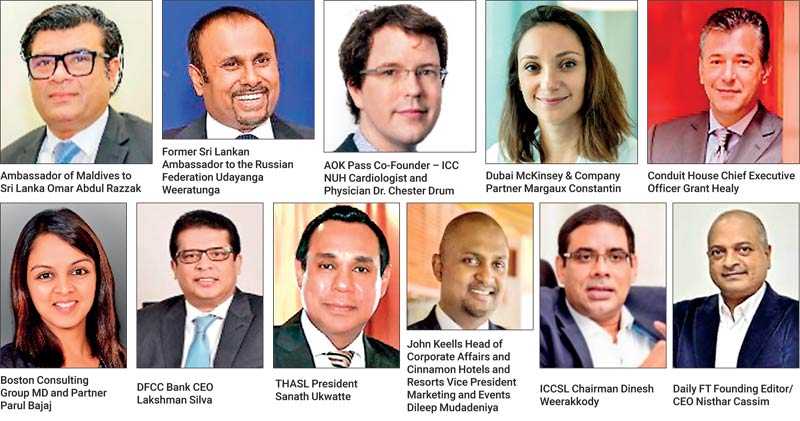Thursday Feb 26, 2026
Thursday Feb 26, 2026
Wednesday, 3 March 2021 00:00 - - {{hitsCtrl.values.hits}}

Tourism has played an integral role in Sri Lanka’s economy and has remained resilient over the years. Income from tourism in 2019 was over $ 5 billion. However, with restrictions on mobility and health concerns coming to the fore, the tourism industry in the country has borne the maximum brunt.
In this context, the ICC Sri Lanka, CIMA, Daily FT, and ECCSL and BCG organised a webinar discussion on ‘Strategies for Revival of Tourism in Sri Lanka’.
The need of the hour is to envisage a durable and scalable solution for tourism revival that addresses the health and safety of people and is yet seamless and operationally efficient. Keeping these imperatives in mind, Dr. Chester Drum, AOK Pass Co-Founder – ICC NUH Cardiologist and Physician has leveraged blockchain technology to authenticate medical records and create a digital network to enable tourism. “It is a simple and interconnected process that allows complete privacy to individuals while ensuring security that the information provided is 100% accurate,” shares Dr. Drum.
The first step towards creating long-term solutions is to understand the future of travel and the imperatives of tomorrow. BCG Managing Director and Partner Parul Bajaj sketches a picture of the future of travel, the changing needs of the customer, and the strategies to adopt for revival.
“According to our research, consumers have missed leisure travel more than anything else. More than 60% of the consumers we surveyed said that they just ‘can’t wait to travel’ while almost 40% responded that they can see themselves travelling in the next six months,” shares Bajaj.
Inevitably, consumer behaviors and expectations during this period of rebound are going to look different. Consumers will prefer digital interactions, will be looking to make safer choices and real-time decisions. Further, focus on hygiene is going to be strong while price will continue to hold sway. Strategies designed to give a fillip to tourism should focus on these factors and ensure that hygiene focused initiatives form an integral part of the messaging.
Echoing some of these thoughts, Sonali Chatterjee, Independent Tourism and Nation Branding Consultant formerly with CNN and BCC, said: “Maintaining communication with customers is essential. Sri Lanka already has a set of tourists who keep coming back. What the country needs to do is clearly communicate the safety precautions established. This will assuage their anxiety, inspire trust, and encourage them to visit the country.”
Dubai McKinsey & Company Partner Margaux Constantin points out: “The speed at which we gain control over the virus spread will largely determine recovery options for the economy and for travel.”
From that perspective, Maldives has been fairly successful in attracting back tourists and as such the steps taken by the country can be instructive. “Tourism in the country was enabled through the development of COVID-19 safe tourism guidelines and by attaining credible accreditation and acknowledgement from external institutions and bodies,” shared Ambassador of Maldives to Sri Lanka Omar Abdul Razzak.
Considering the disconnected and geographic dispersion of Maldives, the model adopted by it might not entirely be relevant for a country like Sri Lanka. The need is to focus on what the tourists want and accordingly establish strategies that can effectively meet those requirements without compromising on health and safety.
As Hotels Association of Sri Lanka President Sanath Ukwatte points out: “So far, Sri Lanka has managed the bubble tourism well. Tourists remain within designated hotel premises until they complete their 14 days quarantine and then can travel in a restricted manner across the country.” He added that it will take around two years for the industry to bounce back.
However, former Sri Lankan Ambassador to the Russian Federation Udayanga Weeratunga highlighted that tourists want to step out, go for excursions and shop. The next step is to enable this. Sri Lanka he said needs to be flexible with the quarantine regulations like other markets now that people are getting vaccinated.
Today, there is a ray of hope that the industry will get back on its feet. The woes of the Sri Lankan tourism industry started before the COVID outbreak with the Easter Sunday bombing. The government has provided loan moratoriums and lent the necessary support and concessions to the tourism industry.
“The country needs to create regulations that can strike a balance between the health considerations and provide tourists with easy access,” believes DFCC Bank Chief Executive Officer Lakshman Silva. The way forward is going to be one of collaborative effort and team work.
According to Conduit House Chief Executive Officer Grant Healy, “There needs to be good coordination amongst industries that form a part of the tourism ecosystem – this would include the airport authorities, hospitals, and the hospitality industry.”
Indeed, Rome was neither built in a day and nor by a single person. Astutely summing this up, Galle Face Group Deputy Chairman Mathias Roeke said, “Sri Lanka must consider the long-term implications of this crisis. The need of the hour is to be very reactive and ensure tight coordination with the respective bodies. More than anything else, we need to learn day by day.”
The session was moderated by ICCSL Chairman Dinesh Weerakkody, Cinnamon Hotels and Resorts Vice President Marketing and Events Dileep Mudadeniya and Daily FT Editor Nisthar Cassim.